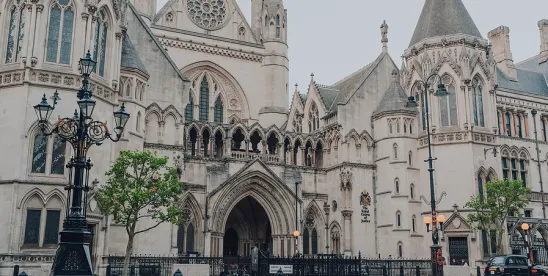On July 26, 2023, the UK Supreme Court gave judgment in R (on the application of PACCAR Inc and others) v Competition Appeal Tribunal and others[1].
By a majority of four to one, the Supreme Court held that litigation funding agreements (LFAs) (which entitle funders to be paid a proportion of any damages recovered) are “damages-based agreements” (DBAs), within the meaning of section 58AA of the Courts and Legal Services Act 1990 (the 1990 Act). As a result, LFAs are unenforceable unless they comply with the relevant regulatory regime for DBAs and cannot be used at all to fund opt-out collective proceedings before the Competition Appeal Tribunal (the CAT).
This ruling will have significant ramifications for litigation funders in the United Kingdom as well as claimants and claimant law firms that rely heavily on third-party funding. This impact was acknowledged by the Supreme Court, with Lord Sales noting (in the leading judgment) that the Court had been informed that “most third-party litigation funding agreements would…be unenforceable as the law currently stands”[2].
The Supreme Court’s Decision
This issue arose in the context of the well-known “Trucks” litigation before the CAT.
In 2016, the European Commission found that five truck manufacturing groups had engaged in anti-competitive behaviour by delaying the introduction of low-emission technologies and passing on the costs for the emissions technologies to customers. After that decision, two applications were made to the CAT under section 47B of the Competition Act 1998 to bring follow-on collective proceedings. However, to obtain a CPO, the applicants needed to show that they had adequate funding arrangements in place to meet their own costs and any adverse costs orders that may be made against them should they lose. This condition is a prerequisite for any claim to be certified as collective proceedings in the CAT. Both applicants relied on LFAs to meet those requirements.
The truck manufacturers objected to the CAT making a CPO on the ground that the funding arrangements were DBAs, which did not comply with the Damages Based-Agreements Regulations 2010 and were therefore unenforceable.
Sub-sections 58AA(1) and (2) of the 1990 Act[3] provide that a DBA will be unenforceable unless certain conditions are complied with. Shortly after the insertion of section 58AA, the Damages Based Regulations 2013 came into force (the 2013 Regulations). The 2013 Regulations set out further requirements which must be satisfied if a DBA is to be enforceable. It was accepted that the LFAs entered into by the applicants would not satisfy those conditions; therefore, the question as to whether they constituted DBAs was critical for the purposes of their enforceability.
The key issue concerned the definition of a DBA under section 58AA(3) of the 1990 Act and, specifically, whether the LFAs involved the provision of “claims management services”. Under section 58AA(7), this phrase is defined by reference to earlier legislation, namely the Compensation Act 2006 (the 2006 Act) until 1 April 2019 and the Financial Services and Markets Act 2000 (FSMA) thereafter. Under section 4 of the 2006 Act, such services were defined as “advice or other services in relation to the making of a claim” and “other services” included a reference to “the provision of financial services or assistance”[4].
The CAT and the Divisional Court both ruled against the truck manufacturers and held that the LFAs in question did not involve the provision of “claims management services”. Accordingly, they were found not to be DBAs.
On a leap-frog appeal to the Supreme Court, the Court allowed the truck manufacturers’ appeal by a majority of four to one. The key points from Lord Sales’ leading judgment include:
- The definition of a DBA for the purposes of section 58AA(3) of the 1990 Act must be determined by reference to the 2006 Act and the words “claims management services”, when read according to their natural meaning, were capable of covering the relevant LFAs that had been entered into[5].
- In relation to the statutory purpose, the Court held that Part 2 of the 2006 Act was intended to provide a broad power to allow the Secretary of State to decide what targeted regulatory response might be required from time to time as information emerged about what was then a new and developing field of services seeking to encourage or facilitate litigation, where the business structures were opaque and poorly understood at the time of enactment. The wide language used in section 4 of the 2006 Act, and the degree of Parliamentary control for the future exercise of the section 4 power, which is a feature of the scheme of Part 2, were “strong indications of this”[6]. “Viewed in this light”, the Court held that there was “good reason to think that Parliament used wide language in section 4 deliberately and with the intention that the words of the definition of “claims management services” should be given their natural meaning”[7].
- The 2013 Regulations are not a permissible aid to interpreting “claims management services” as defined in the 2006 Act. They were not introduced broadly contemporaneously with the 2006 Act “as part of a single coherent scheme”[8]. By contrast, the Compensation (Regulated Claims Management Services) Order 2006, together with its accompanying Explanatory Memorandum, were broadly contemporaneous and formed part of the same legislative scheme, and so were a legitimate aid to the interpretation of the 2006 Act. These support the interpretation of the definition of DBA which the Supreme Court found in favour of[9].
- While there might be nothing objectionable in principle about litigation funding on what has become the conventional model, it does not follow that Parliament must have intended to leave such arrangements outside the scope of the definition[10].
- None of the above was affected by the fact that many agreements have been concluded on the basis that they did not fall within the statutory definition of a DBA[11].
The Impact of the Supreme Court’s Decision
As the CAT does not currently permit DBAs in opt-out cases[12], the immediate impact of this decision remains extremely unwelcome to litigation funders- although this may soon change. On 15 November 2023, the government tabled an amendment to the Digital Markets, Competition and Consumers Bill[13] to allow the use of DBAs with litigation funders in opt-out proceedings in the CAT.
Even if the amendment is passed, however, (and assuming it is passed as it is currently drafted), it will not solve all of the problems for litigation funders. As the amendment stands, it does not remove the need for LFAs to comply with the 2013 Regulations if they fall within the definition of a DBA – i.e. litigation funders will still need to ensure that their LFAs are either not DBAs, or ensure that they comply with the 2013 Regulations. Unless and until such an amendment is passed, though, many of the funding agreements that have been put in place to pursue such cases are currently rendered unenforceable. More widely, whilst this decision is unlikely to be a fatal blow, with litigation funding crucial to the ever-increasing number of group actions in areas including data privacy, ESG and consumer protection, litigation funders and claimant law firms that depend on litigation funders will need to reassess their existing funding agreements for different types of claims to determine if they are enforceable. Where necessary (particularly for opt-out cases currently at the CPO stage), funders will need to renegotiate their existing funding agreements for their claims to proceed, as is apparently the case in Justing Gutmann’s application to commence opt-out proceedings against Apple. At a hearing on 11 and 12 September 2023, counsel for Mr Gutmann told the CAT that he was still in discussions with the funder to amend the LFA in such a way as to comply with the Supreme Court’s decision[14]. Funders will be hopeful that claimants will be willing to renegotiate their agreements, as it may not be financially viable for claims to proceed without the funding in place, as costs in opt-out cases in the CAT typically run into the millions and take years to resolve. However, claimants could refuse to renegotiate their LFAs, which would potentially leave funders unable to recuperate their returns.
[1] [2023] UKSC 28.
[2] Judgment, paragraph 13.
[3] Section 154 of the Coroners and Justice Act 2009 inserted section 58AA into the 1990 Act.
[4] Section 4(2)(b) of the2006 Act.
[5] Judgment, paragraph 50.
[6] Judgment, paragraphs 60 – 72.
[7] Judgment, paragraph 72.
[8] Judgment, paragraph 47.
[9] Judgment, paragraph 61 and 73.
[10] Judgment, paragraph 69.
[11] Judgment, paragraph 91.
[12] Section 47C(8) of the Competition Act 1998 excludes the use of DBAs for opt-out claims.
[13] digitalmarkets_rm_rep_1115 (parliament.uk). [14] https://www.catribunal.org.uk/cases/14687722-mr-justin-gutmann.




 />i
/>i

